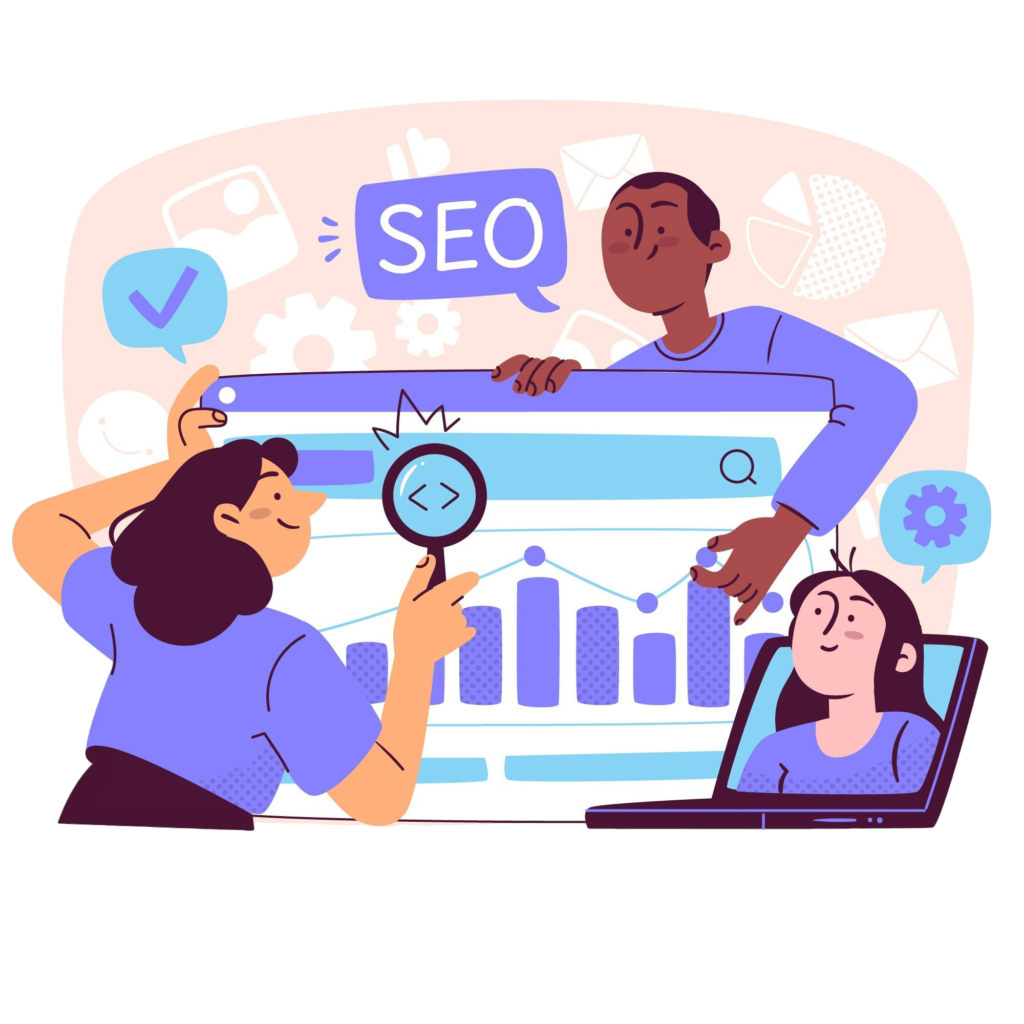
With the constantly changing face of digital technology, Digital Marketing has emerged as a lifeline for e-commerce. In the highly competitive marketplace, it is no longer a choice but rather a compulsion for those seeking survival. Whether big or small, new online businesses or established online sellers, using digital marketing proficiently could attract substantial amounts of traffic to your site, increase customer engagement, and, in turn, improve sales.
It’s an in-depth blog to discuss how digital marketing will revolutionize your e-commerce business, critical parts of successful strategies, and the future of digital marketing within the e-commerce space.
What is Digital Marketing?
At its very core, digital marketing simply describes all marketing activities that utilize the internet or electronic devices. It involves a wide range of online channels such as search engines, social media, email, and websites among others for communicating with current and future customers. Unlike traditional methods of marketing that reach wider areas with less accuracy, digital marketing enables targeted and personalized engagement.
Digital marketing brings an advantage of scalability and cost-effectiveness benefits to e-commerce companies. Also, with the right digital marketing strategies, your products will reach the most relevant audiences at the right time. Moreover, it has become easy to track and measure the ramifications of any digital marketing activities, thus permitting continuous campaign adjustments and ultimately the betterment of overall marketing ROI.
Why Digital Marketing is the Backbone for E-commerce?
The situation of the current e-commerce companies is really dog-eat-dog competition. With so many online stores gaining popularity, it is not that easy to be one of a kind from the rest of the crowd. It is precisely this reason why digital marketing becomes such a treasure.
An effective digital marketing strategy shall help to achieve several key objectives for an e-commerce business:
- Drive Traffic to Your Website: Digital marketing lets your site be more visible so potential customers easily look for you. Through SEO strategies, as well as PPC advertising, you can drive targeted traffic to your e-commerce store.
- Bounce into Conversions: Relevant targeting through digital marketing can turn casual visitors of a website into paying customers. Digital marketing-through retargeting ads, email marketing, social media campaigns, and so on-makes the correct customer bounce into a conversion.
- Build Brand Awareness and Trust: E-commerce business can build a strong brand by providing an online presence, sharing valuable content, and interacting with customers through digital marketing platforms. Consistent communication within digital channels leads to the development of trust among customers, for retaining them.
- Low Cost Marketing: Return on investment from digital marketing can potentially be significantly higher in comparison to more traditional forms of advertising. Content marketing, SEO, and social media marketing require a far smaller amount of investment but yield long-term results; hence, digital marketing is relatively more economical for e-commerce new start-ups and small ventures.
- Real-Time Performance Measurement: This is where the largest advantage comes from measuring the outcome in real time: one can see campaign performance analysis, how users behave, and areas that require optimization to give better results using either Google Analytics or even social media insights.
Key Components of Digital Marketing for E-commerce
There are several pillars of digital marketing coming together to produce the effects. To be able to create a prosperous e-commerce business, it is important to focus on a mix of these key elements.
1.Search Engine Optimization (SEO)
SEO is that vital online marketing strategy to boost the view of your e-commerce website in the search results of the different search engines. Thus, when potential buyers surf through these search engines Google or Bing in order to find products related to your business, a higher ranking on those will ensure that people can eventually see your store.
Why is SEO Important?
Organic Traffic Growth: SEO is all about improving your website’s ranking in various search engines, thus getting organic traffic for clicks instead of the need to pay for clicks. A great SEO strategy will ensure that your website ranks for relevant keywords, with targeted visitors interested in your products.
- Long-term benefits: Unlike PPC advertising, the benefit of search engine optimization survives for long. Once your website begins to rank for key search terms, it continues bringing in traffic over time without any extra money.

How to Implement SEO?
- Keyword research tools help you find the traffic keywords about your products.
- Optimize your product descriptions, meta title, and meta description using relevant keywords.
- Focus on building high-quality backlinks and improving your site’s speed and mobile responsiveness.
2.Social Media Marketing
The advent of social media has transformed the way business houses interact with their customers. For e-commerce brands, social media marketing forms an essential digital marketing strategy to build brand awareness, engage with the target audience, and drive traffic to the website.
Benefits of Social Media Marketing:
- Brand Building. These social media networks are best suitable to showcase the products, engage with the target customers and develop customer loyalty by brands.
- Engagement. With posts, stories, and live videos, social media provides you with more interaction with content on the platform. The more engaged your followers are, the more likely to become paying customers.
You can specifically target your ads on a wide range of demographics, behaviors, and interests. So, with paid social media advertising, social media remains one of the best to reach your ideal customers.

Successful Social Media Strategies:
Sharing interesting content demonstrating your products; using influencer marketing with popular social media influencers; hosting contests, giveaways, and polls to make the lives of the viewers interesting.
3.Email Marketing
Email marketing remains one of the most powerful digital channels to help e-commerce store owners drive sales. With a well-thought-through email strategy, you can nurture leads, promote new products, and create long-term relationships with customers.
Why Email Marketing Works:
- Personalization: Email marketing lets you send personalized messages relevant to the customer’s behaviors and preferences to maximize conversions.
- Automated Campaigns: Automation tools enable you to reach the right email at the right time. Be it a welcome email or an abandoned cart reminder, email marketing campaigns can make a real difference and drive sales.
- Cost-Effective: As far as other advertisement methods are concerned, not only is email marketing cost-effective but also very effective; therefore, it proves to be the best investment for businesses in e-commerce sectors irrespective of sizes.

Tips for Successful Email Marketing:
Segmentation of the email list to demographics, history of past purchases, and browsing behavior of customers. Highly active subject lines will influence higher open rates and make the call-to-action button easily visible, motivating a customer to buy.
4,Pay-Per-Click Advertising
PPC advertising is very effective for e-commerce sites that require the generation of instantaneous traffic on your website. Using such services as Google Ads or social media advertising, you can now develop specific advertisements that will target the audience in search engine results pages or targeted social media feeds.
Benefits of PPC Advertising:
- Incorporation of Instantaneous Results: A traffic-building strategy such as PPC exhibits immediate results that are not displayed with SEO. This is helpful to business e-commerce when selling flash sales or seasonal merchandise.
- Highly Targeted Ads: PPC campaigns allow you to target specific keywords and demographics and even certain geographic locations, so your ads reach the right people.
- Budget Control: Since with PPC you pay per click, you get the chance to define budget in terms of what you want to achieve.

Best Practices of PPC Campaigns:
- Target high-converting keywords with commercial intent.
- Always monitor and optimize ad performance towards better ROI and cost reduction.
- Use compelling ad copy and high-quality images to attract clicks.
The Future of Digital Marketing in E-commerce
How do we expect the landscape of digital marketing to change with the ever-developing technologies? It is up for grabs. The future of e-commerce digital marketing is about to be defined with a little help from some major trends: AI-driven marketing, voice search optimization, and hyper-personalization.
- AI and Automation: AI-tools have revolutionized digital marketing in the following way by availing for business companies to automate several tasks- like cutting up the customer’s database, producing content, as well as supporting customers. For example, AI-driven chatbots provide instant answers to website visitors, thus offering a better user experience and conversion rates.
- Voice search optimization: The concept of voice search optimization is also helpful because when voice assistants gain popularity, as do Siri and Alexa, communication with customers using their voices becomes more important for your e-commerce store. The content should be more conversational and include many long-tail keywords to gain maximum voice search traffic.
- Hyper-Personalization: Personalization is going to characterize the future of digital marketing. Using customer data, e-commerce companies can provide hyper-personalized shopping experiences, everything from personally selected product recommendations to personalized emails.
Conclusion
To sum it up, digital marketing is the way to unlock the potential for success in e-commerce. It is because SEO techniques, social media marketing, email marketing, and PPC advertising will attract people to your e-commerce business. It increases the chances of successful conversions and eventually enhances long-term relationships with customers. With the rise in digital marketing, the ability to shift according to the latest trends and embrace new technologies will push your business ahead.
